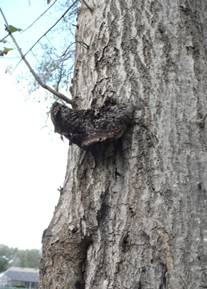Hispidus Canker
Natural History

Hispidus canker on laurel oak | Photo credit: Dr. Jason Smith, UF/IFAS
Hispidus canker is a tree infection caused by the fungus Inonotus hispidus. This disease primarily affects water, willow, and laurel oaks in Florida (though other hosts such as hickory are known).
The pathogen kills the cambium, and also degrades the sapwood of the host - causing sunken elongated lesions on the stems of the trees. This is known as a canker-rot pathogen. Eventually, the pathogen produces a whitish-yellow "conk," or shelf-like fruiting body. Spores are released from the conk during cool, wet weather, and go on to infect new hosts – usually at wounds or pruning sites.
Later - after releasing the spores - the conk dries out, becomes black, and often falls from the tree.
